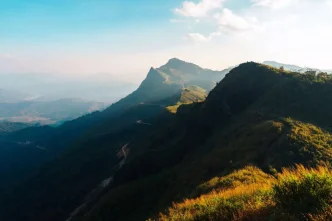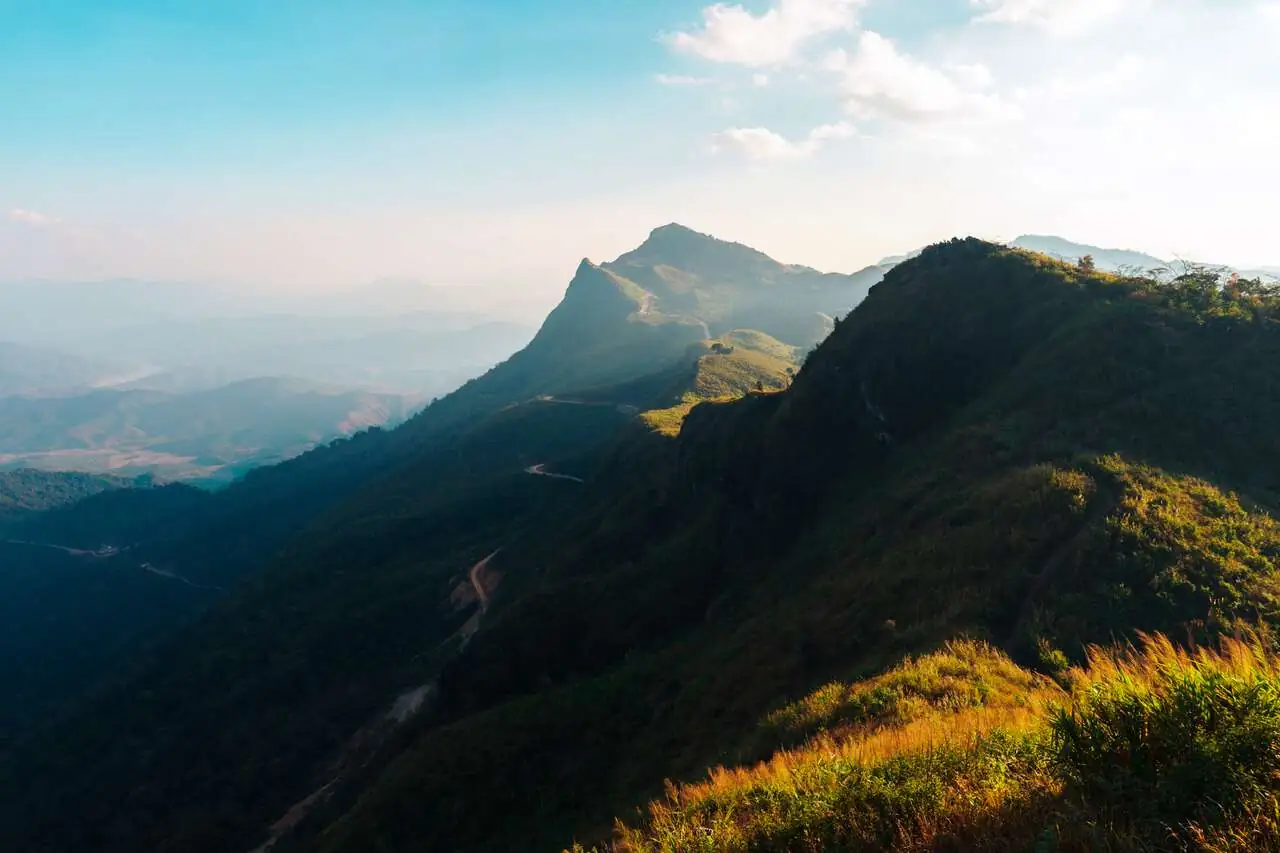By Lars Vinter, South East Asia Correspondent
Thailand has shuttered the iconic Pointed Cliff viewpoint at Phu Chi Fa National Park in Chiang Rai after stray bullets from violent clashes in Laos crossed the border, striking homes and sparking safety fears. The fighting, pitting Lao soldiers against unidentified militias in Bokeo province, left five dead and 13 injured, prompting Thai authorities to bolster patrols and urge vigilance. While some speculate the violence stems from drug smuggling or ethnic tensions, no official cause has been confirmed, leaving the region on edge. The closure, effective 5 May, highlights the precarious balance of security and tourism in the Golden Triangle, where Thailand, Laos, and Myanmar meet.
The clashes erupted on 3 May at 10:00 am and continued into 4 May at 6:30 pm, centered at Laos’ Phu Pha Mon military base in Pak Tha district, opposite Thailand’s Wiang Kaen. A 7.62mm bullet pierced a rooftop in Rom Fa Pha Mon village, Tambon Por, damaging a home but causing no injuries. “The situation remains tense, and we’re prioritizing safety,” said Thanitpong Ratanapol, Chief of Phu Chi Fa National Park, announcing the indefinite closure. As Thai forces secure the 183-km border, the incident underscores the challenges of managing spillover from Laos’ internal conflicts in a region vital for tourism and trade.
Escalation and Thai Response
The violence in Pak Tha district saw Lao outposts overrun, with five soldiers killed and several wounded or trapped. Thai village heads in Tambon Por’s Moo 14 and Moo 15 reported hearing sporadic gunfire, prompting Wiang Kaen District Chief Suphot Lankawiranan to issue warnings. Thai border commander Major General Chantra requested Lao cooperation, but Bokeo authorities described the clashes as an “internal matter,” offering no further details.
Speculation abounds about the fighting’s cause. The Golden Triangle’s role as a drug trafficking hub raises suspicions of narcotics-related violence, especially after a April 2025 seizure of 20 million methamphetamine pills in Bokeo. Alternatively, ethnic unrest among Laos’ marginalized groups, such as the Hmong, could be a factor, though Lao officials have not confirmed either theory. If drug-driven, the clashes may signal retaliation for recent crackdowns; if ethnic, they could reflect deeper grievances. Without evidence, these remain hypotheses, and Thailand is focusing on containment rather than speculation.
Thai authorities have responded decisively. The 3rd Army Region deployed additional checkpoints across Wiang Kaen and Thoeng districts, urging residents to avoid border areas like Pha Tang and Phu Chi Dao, where gunfire was also reported. Suphot emphasized close monitoring, with no Thai injuries or Lao refugees recorded, easing fears of broader escalation. The US embassy in Bangkok issued a travel alert, citing the region’s drug trade risks, but Thai officials insist the situation is under control.
Phu Chi Fa’s Tourism and Local Impact
Phu Chi Fa, known for its breathtaking sunrise views over the Mekong, is a cornerstone of Chiang Rai’s tourism, drawing thousands annually. Spanning Tambon Por and Tubtao, the park is transitioning to national park status, a process paused by the closure. While only the Pointed Cliff viewpoint is affected, local businesses feel the strain. “Bookings are down, but it’s low season, so the hit is manageable,” said Bunterng Kheruwong, a resort owner near the park. Chiang Rai, hosting 2.5 million visitors yearly, faces economic ripples if the closure persists, though authorities hope to reopen soon.
Local sentiment, shared on platforms like X, mixes frustration and caution. Users urged safety measures, with some linking the closure to broader border unrest, including tensions in Tak province. The closure reflects Thailand’s priority to protect civilians, but it risks signaling instability, particularly after recent anti-scam operations along the Thai-Myanmar border.
The Golden Triangle and Thai-Lao Relations
The Thai-Lao border, spanning 1,810 km along the Mekong, supports robust trade, with THB 260 billion exchanged in 2024. Cooperation on drug interdiction, including joint 2024 busts yielding 50 tonnes of methamphetamine, has strengthened ties. Yet, the Golden Triangle remains volatile, with drug trafficking generating USD 18-37 billion annually. The 2021 Myanmar coup and Myawaddy’s scam centers have further destabilized the region, though unrelated to the Lao clashes.
If drug smuggling fuels the violence, as some suggest, it could prompt tighter Thai-Lao patrols, building on past successes. Ethnic tensions, if confirmed, pose a diplomatic challenge, but Thailand’s neutral stance—requesting cooperation without escalation—positions it as a mediator. Laos’ reticence complicates joint efforts, yet both nations share an interest in stabilizing the Mekong corridor.
Regional and Security Challenges
Thailand’s security response strains its resources, with Chiang Rai’s 2025 budget (THB 12 billion) already stretched by southern insurgencies. The 3rd Army’s patrols, while effective, face logistical hurdles across rugged terrain. Laos’ silence limits cross-border intelligence, though Thailand’s diplomatic note seeks to prevent civilian harm. If clashes spread, they could disrupt trade or spark refugee movements, though none have occurred.
ASEAN’s 2024 security framework advocates dialogue, and Thailand’s restraint aligns with this goal. A prolonged conflict could test Thai-Lao trust, but joint drug enforcement offers a path forward. The US and regional partners, monitoring the Golden Triangle, may support Thailand’s efforts, especially if narcotics are involved.
Looking Ahead
The Phu Chi Fa closure, a precautionary measure, reflects Thailand’s delicate balancing act: safeguarding tourism while securing a volatile border. “We’re assessing daily to ensure safety,” Thanitpong said, signaling hope for a swift reopening. Chiang Rai’s governor has called for calm, backed by Thailand’s democratic resilience, with 69% voter turnout in 2024. As Laos grapples with internal strife, Thai-Lao cooperation will be crucial to restore stability and protect communities caught in the crossfire.















